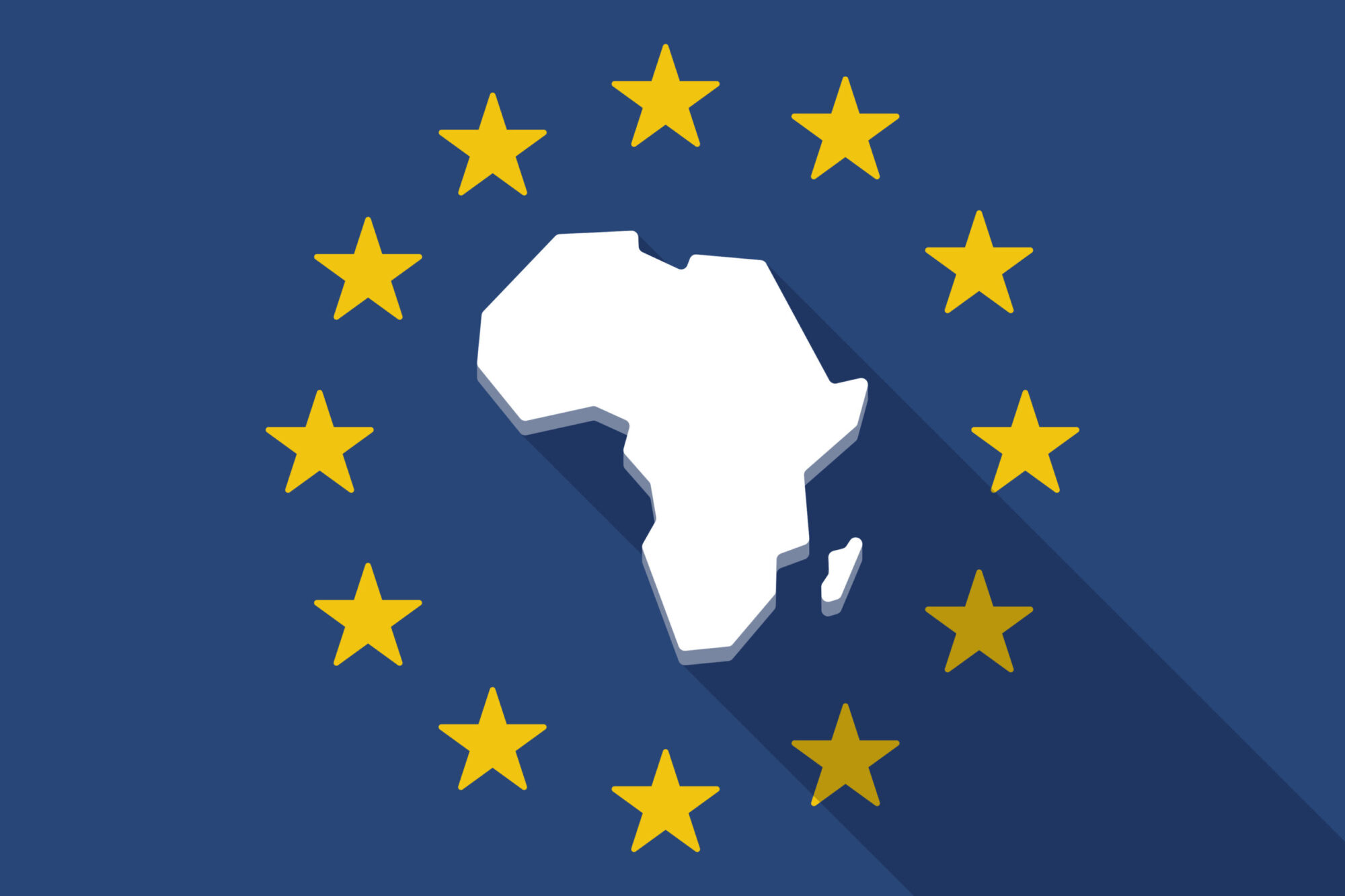Divided by a little less than 15km at their closest tip, Europe and Africa have ties that extend beyond just their physical proximity – the history of the two continents has been linked for centuries; a joint past consisting of colonial violence, uprooted communities, the senseless plundering of natural resources, and other instances of exploitation and abuse of the African continent.
Today, the disastrous effects of Europe’s colonisation of Africa have been acknowledged (at least, to a certain degree). The destruction and loss of lives that was caused by Europe’s brutal actions on the continent have left scars that are still plainly visible to this day. Those at the head of European countries are thus quick to distance themselves from this condemning history, pointing to their current “good” relationship with a number of African countries as proof that all this abuse and destruction is a thing of the past. But is that really so?
Many do not realise that little has changed between now and colonial times in terms of the relationship between the two continents. The abuse of African people, lands and resources did not stop after the decolonisation of Africa. As the Transnational Institute (an international research and advocacy think tank) put it, “the net flow of resources between Europe and Africa remain in Europe’s favour, whether through unequal terms of trade, debt servicing or macro-economic policies that have promoted the extraction of Africa’s resources for external benefit while marginalizing the majority of African people.”¹
To this day, the relationship between Africa and Europe remains completely unbalanced. Even the choice of words used by the President of the EU Commission Ursula von der Leyen (who called for a “partnership of equals”² between the EU and Africa last year), with its suggestion that from now on the partnership should be on equal terms, shows what an uneven playing field this is.
While colonialism may have died once African nations were (nominally) given independence, neo-colonialism quickly rose to take its place. Colonial powers were not particularly fond of the idea of letting go of all the resources they had been freely able to amass during hundreds of years, and neo-colonialism was their way of continuing that flow of resources. And so instead of calling the shots through direct rule of the country, former colonial powers began to exert control in other ways – ensuring that their former colonies remained dependent on them by controlling the economic, political and socio-cultural systems of those countries. As the first president of Ghana Kwame Nkrumah had put it: ‘the essence of neocolonialism is that the State which is the subject to it is, in theory, independent and has all the outward trappings of international sovereignty. In reality, its economic system and thus its political policy is directed from outside.’³
What does this neo-colonialism look like? See: the trade imbalance between Africa and the EU. Agreements like EPAs (Economic Partnership Agreements) give a decidedly unfair advantage to the EU – discussions on the terms of those agreements are made between the EU and each individual ACP (African, Caribbean and Pacific) country, thereby pitting individual African countries against all of the 28 members of the EU.⁴ In the event of a dispute, even a country as big as Nigeria would have a hard time pulling its weight against the combined force of this EU collective. And yet despite the disadvantages of such agreements, African countries are left with little choice in the matter – as ambassador Sir Ronald Randers had pointed out in a keynote speech in 2015: “[countries enter these EPAs] not out of faith but out of fear – fear that higher tariffs will be applied to their exports into the EU market that would make their products uncompetitive, leading to loss of jobs and foreign exchange”.⁵
See also: use of currency to maintain control of a country. When France gave independence to its colonies, it did so on the condition that a number of “cooperation agreements”⁶ – ranging from agreements on raw materials and higher education to foreign trade and currency – were signed. This meant that their former colonies had to continue to use the CFA franc (and those who refused were met with retaliation from France, e.g. Guinea – which had its economy flooded with counterfeit banknotes by the French secret services in response⁷). While the CFA franc provided certain guarantees (i.e. a fixed parity with France’s currency, freedom of transfer of capital and income within the franc zone, etc.), in return several rules were imposed (i.e. 50% of each central bank’s foreign assets having to be deposited in the French Treasury) along with France being present in the BCEAO (Central Bank of West African States) and BEAC (Bank of Central African States) boards, monetary policy committees, and control organs — as well as holding a de facto veto on those boards⁸. Their presence on these boards meant that France could continue to exert control for the benefit of its own economic interests.
These are just two examples of the many ways in which Africa has continued to have an unbalanced relationship with European countries even after the end of colonialism. The ways in which European countries have continued to maintain control over Africa and exploit it to enrich themselves at its expense have stunted Africa’s growth, and it is past time for this relationship to be re-balanced – something that both African and European states are well aware of. That is why last year saw von der Leyen call for a “partnership of equals” and Macron announcing the “death”⁹ of the CFA franc (the transition from CFA franc to the eco currency which would supposedly reduce France’s influence).
But we need more than just declarations of intent or symbolic change (see: only one of the four pillars of the CFA system will actually be affected by the proposed reform and shift to the eco). The structural problems causing this imbalanced relationship between Europe and Africa must be addressed for this imbalance to be redressed. The two continents must stand on an even playing field, and the interests of African countries and their populations must be put at the centre of any agreements decided upon. To put it in a simplified nutshell, using Nkrumah’s words: the aim is “preventing the financial power of the developed countries being used in such a way as to impoverish the less developed. Foreign investment…must be invested in accordance with a national plan drawn up by the government of [African states] with [their] own interests in mind.”¹⁰
This move towards a more balanced relationship will not happen by itself. “Each generation must discover its mission, fulfill it or betray it, in relative opacity,”¹¹ Frantz Fanon told us. The African elite must therefore initiate this reset and assume its mission of advancing Africa by taking a stand and refusing to enable Europe’s meddling in its affairs. And in return, Europe – if it is truly looking to form a “real partnership of equals” – must commit itself to honouring African nations’ right to be the “masters of [their] own destiny”.¹²
References:
¹ Transnational Institute, “Relations Between Africa and the European Union in the 21st Century”: https://www.tni.org/es/node/14690
² Europa Nu “Von der Leyen focuses on unity and partnerships in her first visit to Africa”: https://www.europa-nu.nl/id/vl4bbga0gpud/nieuws/von_der_leyen_focuses_on_unity_and?ctx=vg9pjq8ja4z2&tab=0
³ Nkrumah, K. (1965). Neo-Colonialism,
the Last Stage of imperialism. Thomas Nelson & Sons: London.
⁴ NOW Grenada, “Unfairness of EU EPA Agreements”: https://www.nowgrenada.com/2015/08/unfairness-of-eu-epa-agreements/
⁵ Antillean Media Group, “Do EPAs with the European Union benefit developing countries?”: https://www.antillean.org/eu-epa-disadvantages-212/
⁶ Africa is a Country, “Confronting monetary imperialism in Francophone Africa”: https://africasacountry.com/2019/07/confronting-monetary-imperialism-in-francophone-africa
⁷ Centre for Research on Globalization, “Real Fake Helicopter Money – CIA Counterfeiting Currencies to Destroy National Economies”: https://www.globalresearch.ca/real-fake-helicopter-money-cia-counterfeiting-currencies-to-destroy-national-economies/5606034
⁸ Africa at LSE, “The CFA Franc: French Monetary Imperialism in Africa”: https://blogs.lse.ac.uk/africaatlse/2017/07/12/the-cfa-franc-french-monetary-imperialism-in-africa/
⁹ Le Monde, “La fin du franc CFA annoncée par Emmanuel Macron et Alassane Ouattara”: https://www.lemonde.fr/afrique/article/2019/12/21/la-mort-du-franc-cfa-annoncee-par-emmanuel-macron-et-alassane-ouattara_6023752_3212.html
¹⁰ Nkrumah, K. (1965). Neo-Colonialism,
the Last Stage of imperialism. Thomas Nelson & Sons: London.
¹¹ Fanon, F. (1963). The Wretched of the Earth. Grove Press: New York.
¹² Nkrumah, K. (1965). Neo-Colonialism,
the Last Stage of imperialism. Thomas Nelson & Sons: London.
Written by: Nehemie Bikin-kita

